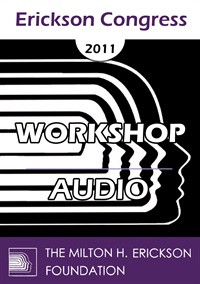IC11 Workshop 36 - MRI Brief Therapy - John Weakland and Richard Fisch at Work - Wendel Ray, PhD
- Average Rating:
- Not yet rated
- Topic Areas:
- Workshops | Brief Therapy
- Categories:
- Erickson Congress | Erickson Congress 2011
- Faculty:
- Wendel Ray, PhD
- Duration:
- 59 Minutes
- Format:
- Audio Only
- Original Program Date:
- Dec 07, 2011
- License:
- Never Expires.
Description
Description:
John Weakland & Richard Fisch’s MRI Brief Therapy is among the most effective & influential models in use today. Original writings and clinical recordings will be used to outline Weakland & Fisch’s contributions to interactional theory and therapy. MRI Brief Therapy conceptual framework and clinical techniques for competency based brief therapy will be demonstrated.
Educational Objectives:
- Articulate the basic problem formation/attempted solution framework and related concepts of Weakland and Fisch’s MRI brief therapy.
- Demonstrate a working understanding of therapeutic strategies for evoking change pioneered by Weakland and Fisch in the practice of effective brief therapy.
*Sessions may be edited for content and to preserve confidentiality*
Outline:
Interactional Theory and Therapy of John Weakland and Richard Fisch
- Workshop introduces interactional theory and therapy, honoring Richard Fisch.
- Review of contributions by John Weakland and Richard Fisch to family and brief therapy.
- Weakland’s background, from chemical engineering to anthropology under Gregory Bateson.
- Discussion of Palo Alto group’s communication and interactional theory, emphasizing context and relationships.
The Palo Alto Group and Its Influence
- Led by Gregory Bateson, included John Weakland, Jay Haley, William Fry, and Don Jackson.
- Weakland’s contributions to penicillin mass production and catalytic cracker.
- The group’s diverse backgrounds shaped fundamental ideas in communication and therapy.
- Emphasis on cultural anthropology methodology in understanding client perspectives.
Cultural Anthropology Methodology and Its Impact
- Weakland’s 1951 paper on firsthand observation of human behavior.
- Process of moving from observation to conceptualization and theory.
- Importance of understanding clients’ language and perspectives.
- Acknowledgment of women’s role in family and brief therapy, including Ruth Benedict, Margaret Mead, and Frieda Fromm-Reichmann.
Formulation of Communication and Interactional Theory
- Palo Alto group’s premises on communication and interactional theory applied to clinical practice.
- Evolution of family therapy, including Don Jackson’s conjoint therapy, Virginia Satir’s approach, and Steve de Shazer’s strategic therapy.
- 1965 founding of the Brief Therapy Center, focused on efficiency.
- Importance of identifying client’s minimal goals and steps in the MRI brief therapy model.
Case Study: Anorexic Daughter
- Parents concerned about daughter’s anorexia, detailing her eating issues, recent decline, and hospitalization.
- Parents’ efforts to help, including childcare and medical consultations.
- Emphasis on closely listening to client’s language and understanding their perspective.
Reflective Listening and Problem Definition
- Problem defined as daughter’s inability to eat and parents’ distress.
- Parents’ attempts to help and daughter’s resistance to medical advice.
- Importance of reflective listening and concrete problem definitions.
Exploring the Client's Worldview
- Discussion of daughter’s strict upbringing and father’s job impact.
- Daughter’s fear of vomiting and parents’ coping efforts.
- Emotional and physical exhaustion of parents acknowledged.
Addressing the Client’s Attempted Solutions
- Parents’ attempts include medical and holistic treatments.
- Caution against false hope and unrealistic expectations.
- Father’s concerns about daughter’s bond with her child and its impact on recovery.
Reflecting on the Client’s Efforts
- Parents evaluate their strategies and challenges.
- Emphasis on patience and thoughtful decision-making.
- Reiteration of MRI brief therapy model steps.
Conclusion and Next Steps
- Continued focus on understanding the client’s worldview and language.
- Reinforcement of reflective listening and clear goal-setting.
- Workshop concludes with next steps in MRI brief therapy.
Mother’s Efforts to Reassure Daughter
- Impact of past experiences on daughter’s emotional state.
- Challenges in expressing love within the family.
- Influence of family dynamics on daughter’s confidence.
- Importance of analyzing mother-daughter conversations.
Details of Conversations and Peace-Making
- Review of mother-daughter conversations and past experiences.
- Daughter’s high IQ and efforts to improve her situation.
- Exploration of past attempts to support daughter.
Challenges in Encouraging Daughter to Eat
- Limited food intake despite parental efforts.
- Struggles in persuading daughter to eat.
- Recognition of mother’s efforts without offering uninformed advice.
John Weakland’s Techniques and Language Use
- Weakland’s skills in hypnotic induction and interpersonal interaction.
- Importance of language choice in therapy.
Mother’s and Father’s Approaches to Helping Daughter
- Mother’s strategy of ignoring the issue while providing food.
- Father’s casual attitude and lack of awareness of severity.
- Incident of father accidentally injuring daughter.
- Daughter’s fear of dying and difficulty understanding her mindset.
Medical Interventions and Diagnosis
- Doctor’s diagnosis of anxiety and medical tests.
- Daughter’s refusal to eat certain foods, reliance on nutritional drinks.
- Signs of improvement and impact of specialized treatment.
Discussion of Husband’s Role and Attitude
- Father’s casual approach and limited involvement due to work.
- Effects of father’s attitude on daughter and family dynamics.
Final Interview and Follow-Up
- Introduction of the miracle question technique.
- Discussion on handling exceptions in the MRI model.
- Follow-up interview confirms daughter’s progress and therapy success.
Credits
Faculty

Wendel Ray, PhD Related Seminars and Products
Wendel A. Ray, Ph.D, is Hammond Endowed Professor of Education and Professor of Family System Theory in the Marriage & Therapy Program, at The University of Louisiana-Monroe (ULM). The former Director of the Mental Research Institute (MRI) in Palo Alto, California, as well as a former member of the MRI Brief Therapy Center, and the MRI Strategic Family Therapy Project, Dr. Ray continues to serve as an MRI Senior Research Fellow.


